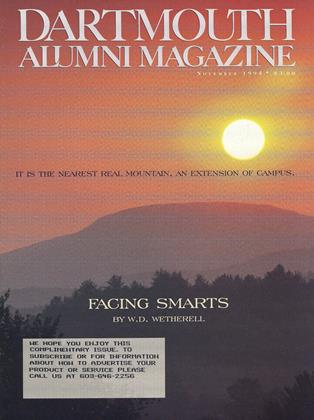The health-care debate goes on, in Hanover as elsewhere, and who better to analyze the pros and cons than C. Everett Koop '37 and Richard Lamm one the former surgeon general, and head of Dartmouth's Koop Institute; the other a former three-term governor of Colorado, a visiting Montgomery fellow, a lawyer, a CPA, and a respected policy wonk.
Under the auspices of the Koop Institute, the Montgomery Endowment, and the College's Ethics Institute and refereed by the latter's director, Professor Ron Green the speakers presented their thoughts to about 200 listeners (and, naturally, two dogs) gathered for a brown-bag-lunch "conversation" on Baker Library's lawn on a beautiful August day. Not surprisingly, the audience comprised a mix of senior citizens and students, including med students.
Koop lamented the failure of early Clinton efforts to reform health care and pointed out that each month an additional 100,000 Americans join the ranks of the medically uninsured. "Everyone has a stake in health care," said the doctor. "Each one of us is being asked to do something for all of us. But the delivery system is too big, too new, too complicated, and has too many lobbies."
Koop also pointed out that in this computer age the revolution in our ability to retrieve and manipulate multitudinous data has its downside. "If a doctor reads two medical articles every night when he gets home, he's only 800 years behind."
Governor Lamm talked about the market forces and the politics that affect today's medicine. "There are now 34 implantable parts that doctors can give you. The miracles have outweighed our ability to pay for them. People live longer, so in health-care terms that means they cost more. And where to allocate the dollars becomes a public-policy question. Tinkering around the edges hasn't worked."
Occasionally humorous observations leavened the otherwise serious discussion."We live in a deathdenying society," said Koop. "Forty percent of Americans say 'IF I die
At the end of this first in a planned series of ethics symposia, moderator Green summed up America's health-care dilemma: "What is the extent of our obligations? What are the limits of our obligations?" It's as though ethicists have inherited the economists' conundrum: "On the one hand..."
 View Full Issue
View Full Issue
More From This Issue
-
 Feature
FeatureLooking for Mister Right Stuff
November 1995 By Jane Hodges '92 -
 Feature
FeatureNUMBER 3
November 1995 By Brooks Clark '78 -
 Cover Story
Cover StoryFACING SMARTS
November 1995 By W.D.Wetherell -
 Feature
FeaturePeter Smith's Tribal Links
November 1995 By Robert Sullivan '75 -
 Feature
FeatureSentimental Sap
November 1995 By Robert K. Nutt '49 -
 Article
ArticleDr. Wheelock's Journal
November 1995 By "E. Wheelock"
Robert Nutt '49
Article
-
 Article
ArticleGift to Library
November 1944 -
 Article
ArticleGive a Rouse for –
December 1979 -
 Article
ArticleTri-County, New Jersey
NOVEMBER 1966 By ARTHUR WILLIAMS III -
 Article
ArticleCarnival's In Town Again
FEBRUARY 1930 By Craig Thorn '32 -
 Article
ArticleLive, From New York!
July/August 2012 By Lauren Vespoli ’13 -
 Article
ArticleAn Early Dartmouth Inventor
June 1954 By RALPH S. BARTLETT '89







